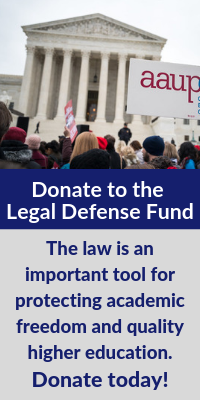Following a legal challenge, supported by an amicus brief in which the AAUP joined, the US Department of Homeland Security (DHS) rescinded a directive that, during the COVID-19 crisis, foreign students engaged entirely in online study would not be allowed in the United States. In March 2020, DHS and Immigration and Customs Enforcement (ICE), issued guidance that, for the duration of the COVID-19 emergency, F-1 and M-1 visa holders were allowed to participate in online education while remaining in the United States. On July 6, 2020, DHS issued a new directive that rescinded this COVID-19 exemption for international students, requiring all students on F-1 visas whose university curricula are entirely online to depart the country and barring any such students currently outside the United States from entering or reentering the United States. Shortly after DHS issued the directive, Harvard University and the Massachusetts Institution of Technology filed a complaint in the US District Court in Massachusetts for declaratory and injunctive relief, to prevent the directive from taking effect so that thousands of international students can continue to participate in educational opportunities in the United States, even if their course of study is online.


